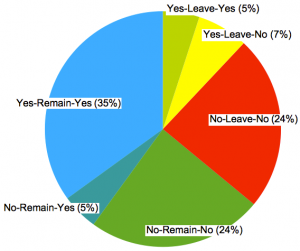Stands Scotland where it did?
 If we take the Panelbase poll from September (which divided the Scottish electorate into four groups, Yes-Leave, Yes-Remain, No-Leave and No-Remain) and combine it with the findings from the recent YouGov poll that found that 15% of the voters who voted Yes in 2014 would now vote No and that 10% of former No voters have moved to Yes, we can draw an interesting graph.
If we take the Panelbase poll from September (which divided the Scottish electorate into four groups, Yes-Leave, Yes-Remain, No-Leave and No-Remain) and combine it with the findings from the recent YouGov poll that found that 15% of the voters who voted Yes in 2014 would now vote No and that 10% of former No voters have moved to Yes, we can draw an interesting graph.
I’m assuming that the two groups losing voters are Yes-Leave and No-Remain because they’re both desperately unhappy with what’s happening. So in the pie chart above I’ve split Yes-Leave into Yes-Leave-Yes (bluish yellow) and Yes-Leave-No (bright yellow), and No-Remain into No-Remain-No (green) and No-Remain-Yes (turquoise). Of the two groups changing their Indyref stance, Yes-Leave-No is slightly bigger than No-Remain-Yes (7% vs. 5%). This is consistent with the fact that YouGov found a tiny drop in the support for Yes.
So basically the polls are practically static because we’re losing slightly more voters to No than we’re converting to Yes.
We should be optimistic, however. We’re unlikely to lose many more Yes-Leave-Yes voters to Yes-Leave-No – surely most of the remaining ones are so strongly pro-independence that nothing can convert them to No – and the Yes-Remain voters are unlikely to go anywhere so long as the Scottish Government remains pro-EU. At the same time, 24% of voters are still to be found in the No-Remain-No camp, and one would expect more of them to drift towards a Yes when it becomes a certainty that the UK is heading for a hard and messy Brexit with no special status for Scotland.
In other words, I expect the polls will start shifting towards Yes soon.
Very interesting. If you are correct with your figures then I agree we will see a surge in “Yes” if a hard Brexit becomes obvious.
I do have an observation though, most shifting of opinion that has been publicly ackowledged is from No to Yes. I have not read anything anywhere where someone has publicly stated they have shifted from Yes to No. Are they just shy? Too embarassed?
Or do we have to consider other factors at play?
I don’t know anyone who’s completely shifted from Yes to No, but I’m getting a fair few stories of folk shifting from Yes to Notvoting.
I’m at a loss to explain it. They keep giving me reasons like:
I don’t like Sturgeon.
The SNP isn’t doing enough. Can’t really pin them down on the problems – it jumps between hospitals, trains, roadworks, schools, council tax.
The SNP will have to raise taxes eventually…
We will have to adopt the Euro if we leave and join the EU.
Brussels and Westminister are as bad as each other – why should we swap one for the other?
If we go Indy, wouldn’t it be very expensive? Especially with all this economic instability now.
Oil’s still low isn’t it?(I expect this to be replaced with “Oil could collapse again!” shortly)
I’ve tried to gently point out the limitations of the Scottish Parliament under devolution, how the income tax powers are a trap, the differences between incorporating and federal unions, the bloody ERM2 mechanism, etc.. They just don’t want to hear any of that complicated stuff. It makes no difference to their day-to-day lives which simply aren’t improving.
That’s very interesting, Alan. I don’t tend to meet people telling me that, so I wonder whether it’s a localised phenomenon. Do you mind me asking where in Scotland you’re staying?
Generally around the West of Scotland – Renfrew, Paisley, Glasgow, etc.
Most of this is from talking to taxi drivers, though – I reckoned they’d be able to sample folk’s opinions more easily than most. Not exactly scientific, I admit, and there’re a few stereotypes of taxi drivers which might get in the way of collecting genuine opinions.
That’s an interesting question, Kangaroo. It is curious, isn’t it, that the opinion pollsters are finding a significant number of Yes->No voters, but you never meet any in real life. I tend to think the opinion pollsters are right, because we all know of examples of No->Yes, so the polls couldn’t possibly be static if nobody moved the other way. So we must be dealing with shy voters. It’s simply too embarrassing to admit that you’ve lost faith in the project.